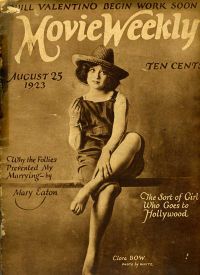Chapter 2
- Please keep these annotations SPOILER-FREE by not revealing information from later pages in the novel.
Page numbers refer to editions with 385 pages, where the story begins on page 3. Not sure if there are other editions with variant pagination. Please let us know otherwise.
Page 14
"Zoy-oyd..."
Prairie is a wonderfully drawn 14-year-old teenager.
The first of many fictitious movies. It's easy to tell, because Pynchon always provides a bracketed date [1980] when he references a real movie, but not a fictitious one. Pia Zadora, whose film career (eg. Santa Claus Conquers the Martians) was going nowhere until she married Israeli multimillionaire Meshulam Riklis in 1977, had some success in film and music, but no longer. Not sure of the connection with the famous silent-film actress Clara Bow.
"the Tube"
Consistently capitalized throughout the book.
"a chair-high bag of Chee-tos and a sixpack of grapefruit soda from the health-food store."
This combination of junk food and health food defines the North Coast redneck hippie perfectly. But Pynchon's insistent hammering on Zoyd's junk-food habit may go a little deeper — like autobiography, maybe?
Page 15
"almost featured on 'Good Morning America'"
15 minutes of almost fame.
"Day-Glo orange [...] some acid green"
"Day-Glo" colors are associated with the Psychedelic Sixties, as they would glow when illuminated with a black light, and "black-light" effects where ubiquitous during that period. "Acid green" makes an appearance in Gravity's Rainbow.
"the million crystal trajectories, smooth as fountain-drops"
Cf. In Gravity's Rainbow: "He's afraid of the way the glass will fall — soon — it will be a spectacle: the fall of a crystal palace." (p.3)
"useful distinction between...defenestrative [and transfenestrative] personality"
Cool Pynchonian satire of California Psychobabble. "Defenestration" is throwing something or someone out an open window; "Transfenestration" is throwing someone through a closed window, breaking the glass, natch. According to Wikipedia, the term was coined around the time of an incident in Prague Castle in the year of 1618, i.e., the Defenestrations of Prague.
Page 16
"Love is strange"
Refers to Mickey and Sylvia's song of the same name. Clearly a Pynchonian favorite; he used it as the lead for his New York Times Book Review piece on Love In the Time of Cholera.
Page 17
"Joey Chitwood-type thrill show"
Joey Chitwood, a legendary "Auto Daredevil," started touring with his death-defying troupe in the 1940s, and continued for decades.
Page 18
"the Uzi machine gun, 'badass of the desert.'"
Pynchon seems moderately hung up on rear ends in this book (and elsewhere). The phrase "badass" recurs constantly (as it did in Gravity's Rainbow too, where it achieved Naval Significance as the USS John E. Badass). In addition there's Trasero County (trasero = Spanish for "rump,") Las Nalgas (Spanish for "buttocks,") and Culito Canyon (culito = Spanish for "little ass.") There's also an echo of Da Conho, the cook in V., whose fantasy involved shooting Muslims in Israel with a .30 caliber machine gun that went "yibble, yibble, yibble." ("Da Conho's machine gun was the only one in the world that went "yibble, yibble," Pynchon pointed out.)
| Chapter 1 pp. 3-13 |
Chapter 2 pp. 14-21 |
Chapter 3 pp. 22-34 |
Chapter 4 pp. 35-55 |
Chapter 5 pp. 56-67 |
| Chapter 6 pp. 68-91 |
Chapter 7 pp. 92-106 |
Chapter 8 pp. 107-129 |
Chapter 9 pp. 130-191 |
Chapter 10 pp. 192-203 |
| Chapter 11 pp. 204-217 |
Chapter 12 pp. 218-267 |
Chapter 13 pp. 268-293 |
Chapter 14 pp. 294-322 |
Chapter 15 pp. 323-385 |
